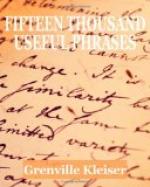The study of words, phrases, and literary expressions is a highly interesting pursuit. There is a reciprocal influence between thought and language. What we think molds the words we use, and the words we use react upon our thoughts. Hence a study of words is a study of ideas, and a stimulant to deep and original thinking.
We should not, however, study “sparkling words and sonorous phrases” with the object of introducing them consciously into our speech. To do so would inevitably lead to stiltedness and superficiality. Words and phrases should be studied as symbols of ideas, and as we become thoroughly familiar with them they will play an unconscious but effective part in our daily expression.
We acquire our vocabulary largely from our reading and our personal associates. The words we use are an unmistakable indication of our thought habits, tastes, ideals, and interests in life. In like manner, the habitual language of a people is a barometer of their intellectual, civil, moral, and spiritual ideals. A great and noble people express themselves in great and noble words.
Ruskin earnestly counsels us to form the habit of looking intensely at words. We should scrutinize them closely and endeavor to grasp their innermost meaning. There is an indefinable satisfaction in knowing how to choose and use words with accuracy and precision. As Fox once said, “I am never at a loss for a word, but Pitt always has the word.”
All the great writers and orators have been diligent students of words. Demosthenes and Cicero were indefatigable in their study of language. Shakespeare, “infinite in faculty,” took infinite pains to embody his thought in words of crystal clearness. Coleridge once said of him that one might as well try to dislodge a brick from a building with one’s forefinger as to omit a single word from one of his finest passages.
Milton, master of majestic prose, under whose touch words became as living things; Flaubert, who believed there was one and one only best word with which to express a given thought; De Quincey, who exercised a weird-like power over words; Ruskin, whose rhythmic prose enchanted the ear; Keats, who brooded over phrases like a lover; Newman, of pure and melodious style; Stevenson, forever in quest of the scrupulously precise word; Tennyson, graceful and exquisite as the limpid stream; Emerson, of trenchant and epigrammatic style; Webster, whose virile words sometimes weighed a pound; and Lincoln, of simple, Saxon speech,—all these illustrious men were assiduous in their study of words.
Many persons of good education unconsciously circumscribe themselves within a small vocabulary. They have a knowledge of hundreds of desirable words which they do not put into practical use in their speech or writing. Many, too, are conscious of a poverty of language, which engenders in them a sense of timidity and self-depreciation. The method used for building a large vocabulary has usually been confined to the study of single words. This has produced good results, but it is believed that eminently better results can be obtained from a careful study of words and expressions, as furnished in this book, where words can be examined in their context.




